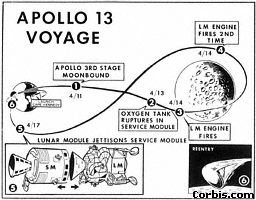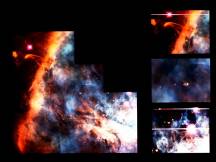|


Emmanuel Leroux Sanders
Tuesday, May 29, 2001
416-02
Editors:
Sean Weeks
You are probably wondering why I chose to do my year-end project on space
exploration. You may think that this essay is not about my year at Hudson High
School. Itís not about things I have accomplished, and those are very good
points, but the reason I chose to do my year-end project on Space exploration is
simple - it is me. Space exploration is one of my many interests. By reading
this you will be learning more about what interests me (and my outlook on the
future) and by doing so you will learn a little part of me that you may not have
known other wise.
 I think that a good place to start this project is when the USSR launched
Sputnik-1 in 1957. To me this is when space exploration began, mostly because
this proved that a piece of hardware could be placed in orbit. This was a big
achievement on the part of the USSR and paved the way to the explorations of the
heavens. Another important space craft was the Luna-1;not only the first man
made object to fly-by the moon but it also discovered Solar Winds. Solar Winds
are made up of a flux of particles, chiefly protons and electrons together with
nuclei of heavier elements in small numbers, that are accelerated by the high
temperatures of the solar corona, or outer regions of the Sun, to velocities
large enough to allow them to escape from the Sun's gravitational field.
I think that a good place to start this project is when the USSR launched
Sputnik-1 in 1957. To me this is when space exploration began, mostly because
this proved that a piece of hardware could be placed in orbit. This was a big
achievement on the part of the USSR and paved the way to the explorations of the
heavens. Another important space craft was the Luna-1;not only the first man
made object to fly-by the moon but it also discovered Solar Winds. Solar Winds
are made up of a flux of particles, chiefly protons and electrons together with
nuclei of heavier elements in small numbers, that are accelerated by the high
temperatures of the solar corona, or outer regions of the Sun, to velocities
large enough to allow them to escape from the Sun's gravitational field.
Although most people only talk about successful missions, I would also
like to point out soem not so successful missions that were launched in the same
time period of Sputnick-1 and Luna 1, from 1957 to 1960. In this period 12
missions were launched and of those 3 of them were unable to leave earth and 2
of them failed to reach their targets (the moon in both cases).
The next big step in space exploration came in 1969 when Thomas Stafford,
Eugene A. Cernan and John W. Young. They became the first people to orbit the
moon (they did so 10 times), this was the final check of the systems because the
next Apollo mission would land on the moon. Apollo 11 was manned by Neil A.
Armstrong, Edwin E. Aldrin, Jr., and Michael Collins. Neil A. Aromstrong became
the first person to walk on the moon. As he stepped onto the surface he spoke
the famous words ďThat's one small step for man, one giant leap for
mankind." This was the first time we stepped on a celestial body other than
earth, riveting the imagination of the world.
 I canít talk about space exploration and leave out one of the most
important missions of all Apollo 13. Apollo 13 was one of the most important
space exploration missions not because if was successful, but because it was
not. It reminded us all of the perils of space travel and how so far away from
earth your all alone and if something goes wrong you canít always count on
earth to help you, although in this case they were saved by engineers from
earth, future mission such as the Mars missions (I am saying this with the
assumptions that we will someday go to Mars) will have to be comprised with very
innovative people if they want to survive because the average delay in
communications between earth and Mars is about 30 minutes.
I canít talk about space exploration and leave out one of the most
important missions of all Apollo 13. Apollo 13 was one of the most important
space exploration missions not because if was successful, but because it was
not. It reminded us all of the perils of space travel and how so far away from
earth your all alone and if something goes wrong you canít always count on
earth to help you, although in this case they were saved by engineers from
earth, future mission such as the Mars missions (I am saying this with the
assumptions that we will someday go to Mars) will have to be comprised with very
innovative people if they want to survive because the average delay in
communications between earth and Mars is about 30 minutes.
Man also got many lessons from the Soviet space station Mir. Mir was
launched in 1986 and was over time expanded with other modules much like the
current International Space station. Mir allowed us to test the endurance of
mankind. It showed us not only the physical effects of long term space travel,
such as the weakening of bones
 and muscles if an astronauts doesnít exercise enough, but also
the physiological effects of being trapped in a very confined weightless
environment. This could turn a person crazy if they are not psychoanalyzed
often. The record for the longest space duration was set by Valery
Polyakov, on Mir who returned to earth on March 22, 1995 after having
spent 438 days on the space station. Mir was all and all very successful in its
15 years or service, having only had one major accident, a fire, which was
contained and did not spread to far. I personally think that Mir should have
staid in orbit and that a country should have bought the station from the
Russians perhaps even the United States could have bought it. It would have made
for a good back-up to the international space station should something happen to
it and the crew was unable to return home. and muscles if an astronauts doesnít exercise enough, but also
the physiological effects of being trapped in a very confined weightless
environment. This could turn a person crazy if they are not psychoanalyzed
often. The record for the longest space duration was set by Valery
Polyakov, on Mir who returned to earth on March 22, 1995 after having
spent 438 days on the space station. Mir was all and all very successful in its
15 years or service, having only had one major accident, a fire, which was
contained and did not spread to far. I personally think that Mir should have
staid in orbit and that a country should have bought the station from the
Russians perhaps even the United States could have bought it. It would have made
for a good back-up to the international space station should something happen to
it and the crew was unable to return home.
 All these missions were pioneering marks of manís will to explore and
learn more about the universe around us, I think that the next major mile stone
in space exploration will be when man steps on Mars for the first time. We are
sending a lot of probes and rovers to study Mars but due to the delay and slow
bandwidth, a space craft sent to Mars can only do so much on itís own,
controlling it from earth is out of the question due to the distance of Mars.
The average signal to Mars takes 30 minutes to send, and on top of that a rover
on the land can transmit only about 3Mb of data per day. Those beautiful
panoramas that we see of Mars can sometimes take weeks to transmit. Although
there is work on an interplanetary web that would allow more data to be
transmitted by using old and new space craft as relay stations, these ideas are
still in their infancy.
All these missions were pioneering marks of manís will to explore and
learn more about the universe around us, I think that the next major mile stone
in space exploration will be when man steps on Mars for the first time. We are
sending a lot of probes and rovers to study Mars but due to the delay and slow
bandwidth, a space craft sent to Mars can only do so much on itís own,
controlling it from earth is out of the question due to the distance of Mars.
The average signal to Mars takes 30 minutes to send, and on top of that a rover
on the land can transmit only about 3Mb of data per day. Those beautiful
panoramas that we see of Mars can sometimes take weeks to transmit. Although
there is work on an interplanetary web that would allow more data to be
transmitted by using old and new space craft as relay stations, these ideas are
still in their infancy.
Sending people to Mars would allow us to be in direct control of
the machines. We could do conduct the tests right there on the spot and get the
results instantaneously. We could also gather ore relevant data because we are a
lot smarter and faster then the rovers. We could set up gardens for future
missiona to have food. We could also set up machines that would produce fuel for
the rockets from the Martian surface perhaps even leading to a permanent colony
on Mars. All the building blocks are there; we only need to find the money
necessary to do it. New propulsion technologies are also making getting to Mars
faster, The Ion drive could get us there in 3 Months, this means not only that
we need to bring less supplies for the trip (hence making the trip cheaper) but
it will also limit the astronauts exposure to radiation.
 Even further in the future I could imagine a space ship with using
a yet to be discovered propulsion system visiting other planets and stars, this
ship going so quickly that time would slow inside the ship giving the appearance
to itís passengers of going faster than light, making trips out of the solar
system that would appear to take weeks and not years. Perhaps even discovering
forms whether they are intelligent or not. Perhaps even traveling to parallel
dimensions also known as other realities. I believe that if the human race
doesnít destroy itself first, it could accomplish a lot. Even further in the future I could imagine a space ship with using
a yet to be discovered propulsion system visiting other planets and stars, this
ship going so quickly that time would slow inside the ship giving the appearance
to itís passengers of going faster than light, making trips out of the solar
system that would appear to take weeks and not years. Perhaps even discovering
forms whether they are intelligent or not. Perhaps even traveling to parallel
dimensions also known as other realities. I believe that if the human race
doesnít destroy itself first, it could accomplish a lot.
http://www.solarviews.com/eng/history.htm
- History of Space Exploration
http://search.gallery.yahoo.com -
Pictures
+ All the
scientific magazines I have read over the years.
|